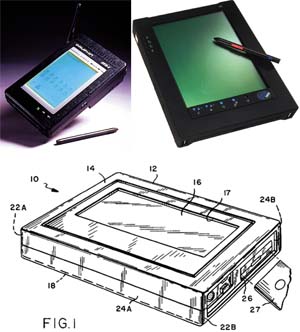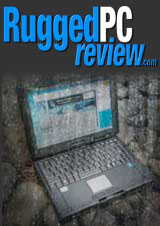« XP Embedded: When benchmarks lie | Main | Tablet PC: We could use a hammer.... »
May 28, 2008
Electrovaya settles patent infringement suit
An interesting situation: An intellectual property company named Typhoon Touch Technologies announced Electrovaya had settled a patent infringement lawsuit by Typhoon and Nova Mobility Systems "for an undisclosed sum representing a royalty payment of at least 20% on past and future sales of its Scribbler Tablet PCs in the United States. Additionally, Electrovaya formally recognized the validity of Typhoon’s patents at issue in the litigation and acknowledged infringement of one or more of the patent claims." (see here)
20% on past and future sales of a tablet? Wow! And recognizing the validity of a patent? That's even more amazing given the vague and confusing nature of many patents. So what is this patent for? That would be US patents 5,379,057, issued January 3, 1995 and 5,675,362, issued October 7, 1997. They both have the same abstract:
"A portable, self-contained general purpose keyboardless computer utilizes a touch screen display for data entry purposes. An application generator allows the user to develop data entry applications by combining the features of sequential libraries, consequential libraries, help libraries, syntax libraries, and pictogram libraries into an integrated data entry application. A run-time executor allows the processor to execute the data entry application."
 The drawings accompanying both patents show a tablet computer like the ones Momenta, IBM, NCR, GRiD, Samsung, Fujitsu, Dauphin, TelePad, Toshiba and many others offered for sale in the early 1990s. The picture on the right shows the drawing included in the 1995 patent and a couple of computers that precede it. The two computers I added for comparison's sake are a 1993 IBM ThinkPad 700/710 and a 1992 Dauphin DTR1. On the surface it's hard to see how a 1995 patent for a "self-contained general purpose keyboardless computer" could impact a 2008 Electrovaya slate when numerous companies made such computers already in the early 1990s. Then again, patents are finicky things and their interpretation is up to courts.
The drawings accompanying both patents show a tablet computer like the ones Momenta, IBM, NCR, GRiD, Samsung, Fujitsu, Dauphin, TelePad, Toshiba and many others offered for sale in the early 1990s. The picture on the right shows the drawing included in the 1995 patent and a couple of computers that precede it. The two computers I added for comparison's sake are a 1993 IBM ThinkPad 700/710 and a 1992 Dauphin DTR1. On the surface it's hard to see how a 1995 patent for a "self-contained general purpose keyboardless computer" could impact a 2008 Electrovaya slate when numerous companies made such computers already in the early 1990s. Then again, patents are finicky things and their interpretation is up to courts.
Anyway, the patents in question were issued to Microslate, a company that was certainly a pen computing pioneer with its ultra-rugged Datellite touch screen computers (see one of our early reviews of it in Pen Computing here).
Interestingly, Typhoon also sued Dell, Xplore, Sand Dune (the Tablet Kiosk folks) and Motion for infringement on touch screen technology and seeks damages for lost profits. Motion reached some sort of settlement. Typhoon apparently thinks that the patent in their possession covers just about the entire mobile market: "manufacturing, selling, offering for sale, and/or importing a variety of portable computer products, including but not limited to tablet PCs, slate PCs, handheld PCs, personal digital assistants (PDAs), ultra mobile PCs (UMPCs), smart phones, and/or other products covered by the patents-in-suit."
The suit has a co-plaintiff in Nova Mobility Systems, located in Tempe, Arizona. Nova, interestingly, offers the SideARM handheld. The SideARM was originally conceived by long defunct Melard and then became part of Microslate's lineup, the very company that was assigned those two patents. Typhoon's Form 10QSB shows that they bought the patents from Nova Mobility and agreed to pay them a 10% royalty from enforcements. So Microslate, an early player in the rugged slate market, sat on the patents all this time, then sold them, and now they are supposed to cover virtually every mobile device ever made even though such devices existed long before the patents? Elegant.
We're all in favor of respecting intellectual property, but figuring out what exactly that means isn't always easy. When I was a kid many decades ago I envisioned a little black box that told me everything I wanted to know by simply asking a question and let me communicate with anyone who had one. I doodled drawings of it. Does that mean I own the exclusive rights to cellphones, smartphones, Google and the entire web? Sadly not. But it would really be nice to at least have 20% of all those sales.
Posted by conradb212 at May 28, 2008 4:36 PM

















